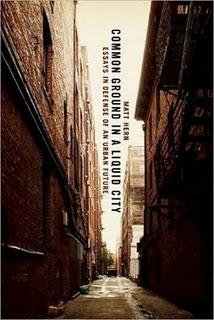Common Ground in a Liquid City: Essays in Defense of an Urban Future

First off, let me say I am not a big fan of urban planning. Even the kindly Jane Jacobs got it wrong with her advocacy of new building along side streets—infill. The condo craze that damages communities from Brooklyn, where I live, to Vancouver, the focus of Common Ground in a Liquid City, can proceed very well along side streets to gentrification and displacement. Author Matt Hern put all my defenses on alert by his proposition early on that continuing urbanization is a given and that greater urban density is essential on a planet of diminishing resources.
Through disarming chunks of personal narrative, Hern manages to craft an argument that soothed me, a victim twice-over of mainstream urban planning, sufficiently enough to win me over. Perhaps city-dwellers can rationally and emotionally work toward a better urban future for all. Patiently, he turns up the dial on radical analysis to indict our metastasizing capitalist “growth” and help us hear its attendant liquid slosh of cash, careers, and mobility.
In both his thoughtful travelogues and his arguments, he gives the concept of place, real dirt and actual location, its rightful, well, place in society and the economy. (He acknowledges the argument that modern communities can also be based on common social and professional interests, but does not refute it here.) For Hern, place is the foundation of community, even though he travels as far as the Kurdish city of Diyarbakir to make his points. He always comes back to his neighborhood in East Vancouver.
I particularly enjoyed his account of his quick get-away from New York City in the face of his partner’s unplanned pregnancy. Not “making it” in New York is a cliched B-movie plot; it is also more often than not a rational and strategic retreat from self-destruction. His is bittersweet, and distance may allow him better to take down the Rudy Giuliani style over policing that doesn’t prevent stabbings on the subway but does drain the city budget.
A few words about the artful structure of the book: each chapter compares Vancouver with another city or town and focuses on making a point. I particularly like how he pinpoints the similarities between Vancouver and Las Vegas, puncturing the self-righteous image of his “green” hometown. Along with his geographic travels, Hern hits practically all the right notes, advocating farmers markets, bicycles and public transportation, and urban agriculture; and dissing tax abatements for stadiums, development that prices out lower-paid workers, competition among cities for the Olympics, and urban branding to attract tourists and capital.
Okay, there is nothing new in the writer being part of the story. Sunday supplement feature writers and neoliberal apologist Tom Friedman have all been doing this for years, but Hern adds one essential ingredient: an authentic commitment to structural change, not from a do-gooder platform, but also for himself, his friends, his family, and all of us. Special message to those going into “urban planning” thinking they will change the world: agitate to get this well-researched but non-stuffy book on the syllabus.